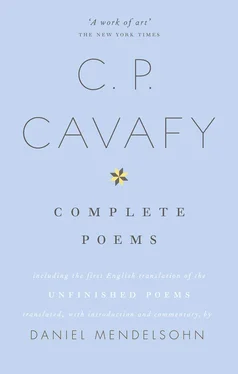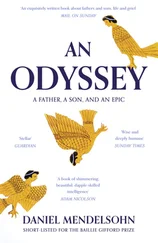The Seleucid’s Displeasure
The Seleucid Demetrius was displeased
to learn that a Ptolemy had arrived
in Italy in such a sorry state.
With only three or four slaves;
dressed like a pauper, and on foot. This is why
their name would soon be bandied as a joke,
an object of fun in Rome. That they have, at bottom,
become the servants of the Romans, in a way,
the Seleucid knows; and that those people give
and take away their thrones
arbitrarily, however they like, he knows.
But nonetheless at least in their appearance
they should maintain a certain magnificence;
shouldn’t forget that they are still kings,
that they are still (alas!) called kings.
This is why Demetrius the Seleucid was annoyed,
and straightaway he offered Ptolemy
robes all of purple, a gleaming diadem,
exceedingly costly jewels, and numerous
servants and a retinue, his most expensive mounts,
that he should appear in Rome as was befitting,
like an Alexandrian Greek monarch.
But the Lagid, who had come a mendicant,
knew his business and refused it all;
he didn’t need these luxuries at all.
Dressed in worn old clothes, he humbly entered Rome,
and found lodgings with a minor craftsman.
And then he presented himself to the Senate
as an ill-fortuned and impoverished man,
that with greater success he might beg.
[ 1910 ; 1916]
He, who on the four-drachma piece
seems to have a smile on his face,
on his beautiful, refined face,
he is Orophernes, son of Ariarathes.
A child, they chased him out of Cappadocia,
from the great ancestral palace,
and sent him away to grow up
in Ionia, to be forgotten among foreigners.
Ah, the exquisite nights of Ionia
when fearlessly, and completely as a Greek,
he came to know pleasure utterly.
In his heart, an Asiatic still:
but in his manners and in his speech a Greek,
bedecked with turquoise, yet Greek-attired,
his body scented with perfume of jasmine;
and of Ionia’s beautiful young men
the most beautiful was he, the most ideal.
Later on, when the Syrians came
to Cappadocia, and had made him king,
he threw himself completely into his reign,
that he might enjoy some novel pleasure each new day,
that he might horde the gold and silver, avaricious,
that over all of this he might exult, and gloat
to see the heaped-up riches glittering.
As for cares of state, administration—
he didn’t know what was going on around him.
The Cappadocians quickly threw him out.
And so to Syria he fled, to the palace of
Demetrius, to entertain himself and loll about.
Still, one day some unaccustomed thoughts
broke in on his total idleness:
he remembered that through his mother, Antiochis,
and through that ancient lady, Stratonice,
he too descended from the Syrian crown,
he too was very nearly a Seleucid.
For a while he emerged from his lechery and drink,
and ineptly, in a kind of daze,
cast around for something he might plot,
something he might do, something to plan,
and failed miserably and came to nothing.
His death must have been recorded somewhere and then lost.
Or maybe history passed it by,
and very rightly didn’t deign
to notice such a trivial thing.
He, who on the four-drachma piece
left the charm of his lovely youth,
a glimmer of his poetic beauty,
a sensitive memento of an Ionian boy,
he is Orophernes, son of Ariarathes.
[ 1904 ; 1916]
The Alexandrians came out in droves
to have a look at Cleopatra’s children:
Caesarion, and also his little brothers,
Alexander and Ptolemy, who for the first
time were being taken to the Gymnasium,
that they might proclaim them kings
before the brilliant ranks of soldiers.
Alexander: they declared him king
of Armenia, of Media, of the Parthians.
Ptolemy: they declared him king
of Cilicia, of Syria, of Phoenicia.
Caesarion was standing well in front,
attired in rose-colored silk,
on his chest a garland of hyacinths,
his belt a double row of sapphires and amethysts,
his shoes laced up with white
ribbons embroidered with pink-skinned pearls.
Him they declared greater than the boys:
him they declared King of Kings.
The Alexandrians were certainly aware
that these were merely words, a bit of theatre.
But the day was warm and poetic, the sky pale blue,
the Alexandrian Gymnasium
a triumphant artistic achievement,
the courtiers’ elegance exceptional,
Caesarion all grace and beauty
(Cleopatra’s son, of Lagid blood):
and the Alexandrians rushed to the festival,
filled with excitement, and shouted acclaim
in Greek, and in Egyptian, and some in Hebrew,
enchanted by the lovely spectacle—
though of course they knew what they were worth,
what empty words these kingdoms were.
[ 1912 ; 1912]
Take care the engraving’s artistically done.
Expression grave and majestic.
The diadem better rather narrow;
I don’t care for those wide ones, the Parthian kind.
The inscription, as usual, in Greek:
nothing excessive, nothing grandiose—
the proconsul mustn’t get the wrong idea,
he sniffs out everything and reports it back to Rome—
but of course it should still do me credit.
Something really choice on the other side:
some lovely discus-thrower lad.
Above all, I urge you, see to it
(Sithaspes, by the god, don’t let them forget)
that after the “King” and the “Savior”
the engraving should read, in elegant letters, “Philhellene.”
Now don’t start in on me with your quips,
your “Where are the Greeks?” and “What’s Greek
here, behind the Zágros, beyond Phráata?”
Many, many others, more oriental than ourselves,
write it, and so we’ll write it too.
And after all, don’t forget that now and then
sophists come to us from Syria,
and versifiers, and other devotees of puffery.
Hence unhellenised we are not, I rather think.
[ 1906 ; 1912]
On an ebony bed that is adorned
with eagles made of coral, Nero sleeps
deeply—heedless, calm, and happy;
flush in the prime of the flesh,
and in the beautiful vigor of youth.
But in the alabaster hall that holds
the ancient shrine of the Ahenobarbi
how uneasy are his Lares!
The little household gods are trembling,
trying to hide their slight bodies.
For they’ve heard a ghastly sound,
a fatal sound mounting the stairs,
footsteps of iron that rattle the steps.
And, faint with fear now, the pathetic Lares,
wriggle their way to the back of the shrine;
each jostles the other and stumbles
each little god falls over the other
because they’ve understood what kind of sound it is,
have come to know by now the Erinyes’ footsteps.
[ 1893 ; 1897; 1903 ; 1909]
Ah, Herodes Atticus, what glory is his!
Alexander of Seleucia, one of our better sophists,
on arriving in Athens to lecture,
finds the city deserted, since Herodes was
away in the country. And all of the young people
followed him out there to hear him.
Читать дальше












